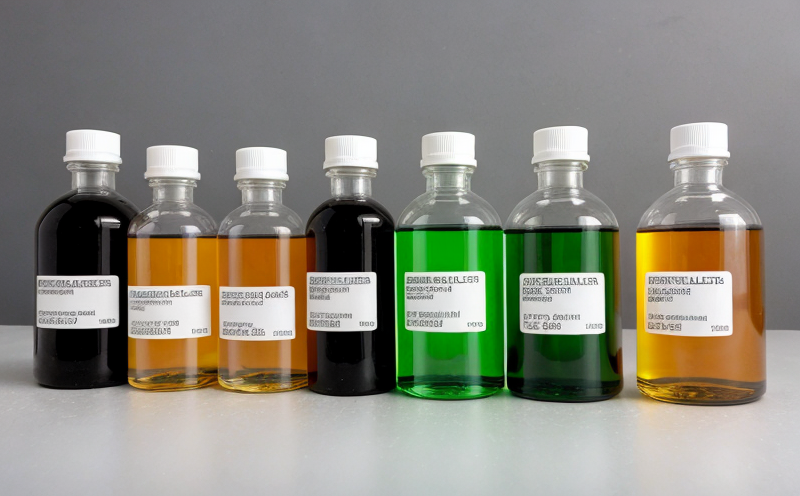Extractables Analytical Method Robustness Testing
The extraction of chemicals from medical devices is a critical aspect of ensuring patient safety and regulatory compliance. Extractables are compounds that can leach out of the device during use, storage, or sterilization processes. The robustness of analytical methods used to identify these extractables plays a pivotal role in assessing the potential risks associated with such materials.
In this context, Eurolab, a leading independent laboratory, offers specialized testing services for evaluating the robustness of analytical methods used in identifying and quantifying extractables from medical devices. Our expertise ensures that you receive reliable data on your device’s chemical profile, facilitating informed decision-making during product development and regulatory submissions.
The process involves several key steps: selection of appropriate solvents, extraction conditions (temperature, time), and post-extraction analysis using various analytical techniques such as High-Performance Liquid Chromatography (HPLC) or Gas Chromatography-Mass Spectrometry (GC-MS). The robustness testing aims to determine if the method can consistently produce accurate results under different conditions without compromising accuracy.
For instance, we may vary the extraction solvent from water-based systems like phosphate buffered saline (PBS) to more aggressive solvents such as ethanol or methanol. Similarly, changes in temperature and duration of the extraction process will be tested to ensure that the method remains consistent across all scenarios. This approach helps manufacturers understand how their devices might interact with various biological environments.
The robustness testing also includes cross-validation studies where different laboratories or analysts perform identical tests on the same samples using standardized methods. These studies help establish reproducibility and reliability of the analytical techniques employed within the industry.
Understanding extractables is crucial because even trace amounts could pose health risks if they migrate into contact with patients. By conducting thorough robustness testing early in the development phase, manufacturers can mitigate potential issues before proceeding further down the pipeline. This proactive approach saves time and resources by avoiding costly rework later on.
Robustness testing not only ensures compliance with regulatory requirements but also enhances product safety by providing comprehensive insights into device interactions. Regulatory bodies like the US Food & Drug Administration (FDA) and European Medicines Agency (EMA) require robust analytical methods to support clinical trials and post-market surveillance programs. Failure to meet these standards could result in delays or even withdrawal of products from the market.
At Eurolab, our experienced team leverages advanced instrumentation and international best practices to deliver accurate results tailored specifically for your needs. Whether you need assistance with method validation studies or ongoing quality assurance checks, we are here to support every step of your journey towards achieving robust analytical methods.
Why It Matters
The significance of robustness testing in chemical characterization and extractables analysis cannot be overstated. Accurate identification and quantification of extractables from medical devices are essential for ensuring both product safety and regulatory compliance.
- Data Integrity: Robust methods guarantee consistent and reliable data, which is crucial for making informed decisions throughout the product lifecycle.
- Regulatory Compliance: Meeting stringent standards set by regulatory authorities ensures smoother interactions with them, reducing potential delays or complications during approval processes.
- Patient Safety: Ensuring that no harmful substances are introduced into patient care enhances overall safety and trustworthiness of healthcare products.
- Cost Efficiency: Early identification of issues through thorough robustness testing saves costs by preventing costly rework or recalls later on.
In today’s competitive landscape, demonstrating a commitment to quality is key. Employing rigorous analytical methods not only meets current standards but also positions your organization favorably for future challenges and opportunities within the medical device sector.
Eurolab Advantages
Expertise: Our team comprises highly experienced professionals with deep knowledge of the latest techniques and best practices in analytical chemistry.
Innovation: We stay ahead of trends by continuously updating our methodologies to incorporate cutting-edge technologies that enhance precision and efficiency.
Compliance: Ensured adherence to international standards such as ISO, FDA guidelines, and EMA regulations guarantees that your results meet all necessary requirements.
Rigor: Every test undergoes meticulous scrutiny, ensuring high-quality outcomes that stand up to scrutiny from regulatory bodies.
Supportive Services: Beyond just testing, we offer comprehensive support throughout the entire process, helping you interpret results and implement improvements effectively.
Quality and Reliability Assurance
- Method Validation: We perform rigorous validation studies to ensure that analytical methods are suitable for their intended purposes.
- Inter-Laboratory Comparability: By participating in collaborative trials, we verify the consistency of results across different facilities and personnel.
- Routine Monitoring: Continuous evaluation ensures that methods remain robust over time, adapting to any necessary adjustments or updates.
- Error Minimization: Strict quality control measures minimize errors during sample handling, analysis, and reporting stages.
These practices contribute significantly towards maintaining the highest levels of reliability and accuracy in our testing services. They form an integral part of our commitment to excellence and continuous improvement.





